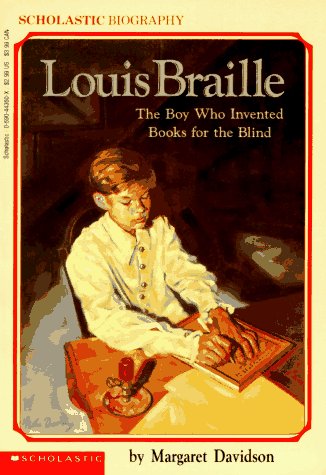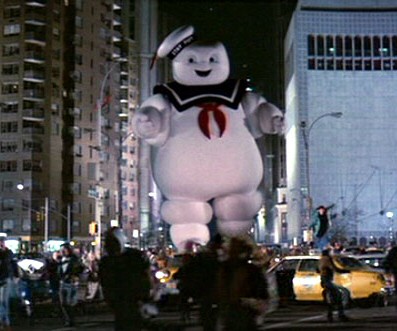What I Want From Santa Claus
Christmastime is the best time. There are sparkly lights and cute reindeer and cute snowmen and cute songs, and so on. There’s also a lot of gifts to be given, which is great, especially if you like books and things, as I do. Alas, almost all Western culture subjects won’t get any gifts from Santa at all, as they only care about their Twitter feed, their sexuality, and leading a “grievable life” so that this doesn’t happen to them. But for those thoughtful boys and girls who don’t go around kissing dead Nelson Mandela’s tushy, they should expect estimable presents. These are the ones I want:
Gossip by Samantha Cohen: Gossip can be malicious and harmful, so everyone should do it.
Cunt Norton by Dodie Bellamy: While the cannon is actually quite commendable, so is cutting, which is what Dodie does to one of the Norton anthologies.
Salamandrine: 8 Gothics by Joyelle McSweeney: According to Diane Sawyer, those divinely deathy Columbine boys “may have been a part of a dark, underground national phenomenon known as the Gothic movement and that some of those Goths may have killed before.” So…
Begging For It by Alex Dimitrov: This boy was the subject of some criticism for his appropriation of some kind of AIDS-related art. But AIDS is silly, and Alex is sort of cute.
Butcher’s Tree by Feng Chen: Her Spork book, “Blud,” was really cute and sassy, so these poems probably will be as well.
Our Lady of the Flowers, Echoic by Chris Tysh: Jean Genet was a violent, cutthroat boy, and I want to see Divine and Dainty Feet in verse.
Haute Surveillance by Johannes Goransson: Johannes read an excerpt from this at the first and only ever Boyesque Reading (also featuring Peter Davis, Tyler Gobble, and me). It was violent, stylish, and totalitarian.
The Memoirs of JonBenet by Kathy Acker by Michael du Plessis: JonBenet Ramsey was cute and tragic. This year, she published a collection of rhymes for my cute and thoughtful Tumblr, Bambi Muse. I want to see how Michael portrays the pageant princess.
The Mysteries of Laura by Andrea Quinlan: It’s a collection of poems that are Victorian and gothic, which is to say it’s Charlotte, Emily, and Anne Bronte and Dylan Klebold and Eric Harris.
Mother Ghost by Casey Hannan: I like ghosts.
Thank You for the Window Office by Maged Zaher: He once composed a very pleasing poem about Paris Hilton.
Since the outside is important too, you should be decking a delightful outfit while you wait for Santa to come. For girls, picking out what to wear isn’t arduous at all, as all girls should wear what they should wear all the time, a babydoll dress, a big but elegant hairbow, and ballet flats. For boys, choosing the correct clothes is much more vexing. Most boys hold the opinion that tight jeans and an ironic top are stylish. But this isn’t so. Style should have meaning. Boy in the vintage Supersonics Shawn Kemp jersey, can you inform everyone who Shawn Kemp is? Are you aware that he once showed up to the Cavaliers training camp as an unacceptable fatty? No, you’re not. Style, like literature, must have meaning. So, while anticipating Santa’s arrival, all boys should wear a meaningful outfit, like the one that I am:
Sunnies because eyes should be kept secret.
Basketball hoodie that I stole from a friend, because basketball players are like monsters.
Purple-striped dress shirt because it’s proper.
A skirt because boys should wear skirts.
Skull-and-crossbone pants because they’re deathy.
Werewolf purple socks to match the purple dress shirt.
Buckled shoes because they’re proper too.
Dress Up with the Contagious Knives
Besides possessing a really pretty first name, Joyelle McSweeney has earned a place as one of the top three poets presently (the other two are Ariana Reines and Chelsey Minnis). Totalitarian, deathy, and melodious, Joyelle has composed a Hunger Games-like novel, an essay about Ronald Regan, and a play, the Contagious Knives, that’s rich in rancor and in rhymes.
The Contagious Knives displays the diction of a nimble rapper and the pitch of an impassioned preacher. As the play’s hero, Louis Braille, tells Bradly Manning, “No indian giving, no taking it back, / except when you take it from me, / Indian, Chinaman, Brad-lee.”
Obviously, Joyelle needs no help decking her characters. Louis’s costume consists of pink panties, a Target t-shirt, a Victorian sailor suit, liquid eyeliner, and more. But what if it was required to dress the Contagious Knives’s characters in designer labels for a French Vogue editorial? What would they wear then? Well, maybe they’d trot out on stage in these things:
Boastful, sassy, and violent, Joyelle’s Louis Braille is a boy for boys to admire. Some of Louis’s first lines are: “I’m a very special cunt. / A very special fucking cunt. That’s what daddy always said / (wink wink).” Not humble about inventing his eponymous language for blind boys and girls, Louis likens himself to napalm and hints at an affiliation with Nazis by repeating “Not see!” four times in a row.
December 12th, 2013 / 1:13 pm
I like Marcus Kelly a lot

In my last post, I mentioned that I wanted to write a little bit about the actor and singer Marcus “Marky” Kelly, who had minor-but I think significant-career in show business from the late 1950s through the 1960s. The highlight of it all was, of course, his teen idolhood in the early 1960s. I had assumed Kelly was gone for good, and quite possibly dead, until I discovered a movie called Filtered Water (director unknown, writer unknown, producer unknown, actors unknown) in my mailbox a few months ago. The movie featured an old actor who I think might be Kelly.
But let me make it clear: I am not 100% sure that the old actor in Filtered Water is Kelly. There are, however, clues. There is a physiognomic similarity-Kelly had bright blue eyes, and a signature half-smile. The actor in the film has bright blue eyes, and a familiar half-smile. There is the timeline-Kelly was born in 1940, and the actor appears to be in his 70s. (And I know this because my folks are in their 70s, and if I look at an old picture of my Dad and a new one, old pictures of Kelly and a screenshot of the actor look to have an uncannily similar progression. The same wrinkles, the same advancing tenderness to the eyes, the same added colors in the complexion. If its him, he’s aged like my dad has aged.) And there is the voice. The actor’s voice sounds like what Kelly’s voice would sound like if it fell apart and was rebuilt. Like a voice does when we age. READ MORE >
CENTERPIECE by Daniel S. Muehlmeier
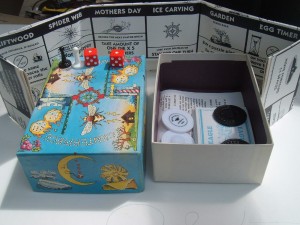 CENTERPIECE
CENTERPIECE
by Daniel Muehlmeier/Lee Mothes
Warm Wax Inc., 1991
2 players / 30 minutes / $19.99 from eBay
CENTERPIECE is a board game designed by Daniel S. Muehlmeier, self-described “unlocker of secrets,” with art by Lee Mothes. It was taken off a Goa’uld mother ship.
You won’t find CENTERPIECE in the Toys & Games section of your local Barnes & Noble. The game, originally published in 1991, is a notoriously tough sell. “I do well in the twenty-dollar range,” said the author in his recent Kickstarter campaign, which managed to raise only $615 of funds from 23 backers. “I keep a few game boxes in my cars back-window. Creating sales proved tough for me.”
“One restaurant placed five games. Near where people pay. All five disappeared, I never even restock them. Example of really bad-marketing skills. Yet I’m really looking forward, to direct mail to customers.” Following the close of the Kickstarter, the game is now being listed on eBay under the heading “tradition game, toys and Hobbies.” Yet this is just a stepping stone for Muehlmeier, who would eventually like to see his game displayed in a contemporary art museum.
Nor is this a delusionary ambition. Bad-marketing skills aside, Muehlmeier’s creation intrigues; in fact, it’s best approached from the vantage point of art (as opposed to game) criticism. Even taken as a game, CENTERPIECE is an answering shot to the pet theory that the whole of a game’s value rests within its mechanical core, for which the superficial elements of theme and appearance serve as mere window dressing.
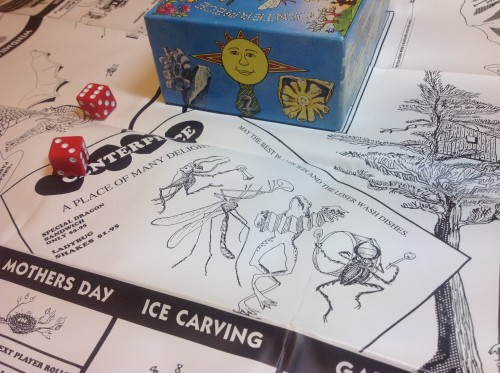
CENTERPIECE‘s mechanisms of play are invitingly familiar. In fact, CENTERPIECE could accurately be called a pastiche of several games known to all American children: Monopoly, Parcheesi, Chutes and Ladders. Pastiche in both senses of the word, since CENTERPIECE‘s core mechanisms walk a tricky line between quotidian simplicity and schizophrenic montage, made no more easily reconciled by the often indecipherable rules, which read like an antique riddle. “Players are encouraged to use common sense,” the single-leaf rules advise. “For example, if both players are sent to the Bird Cage; because a player rolled a two, while visiting the Honey Jar space. The player who rolled snake-eyes would roll for doubles first. Both player would stay for three turns, unless doubles were rolled.”
Once mastered, CENTERPIECE is an almost fully luck-driven affair, a roll-and-move game destined to be despised by the modern board game community, who have become spoiled by worker placement, economic engines, asymmetric player roles, and all the other innovations the last two decades have brought to the medium (remember, CENTERPIECE is a time capsule from the early ’90s, although aesthetically, it hearkens to an even earlier era). Yet the game’s “superficial” elements are not to be discounted, for they create a metaphorical frame or structure as the game plays out, turning a simple reimagining of Monopoly into something that far exceeds the sum of its parts.
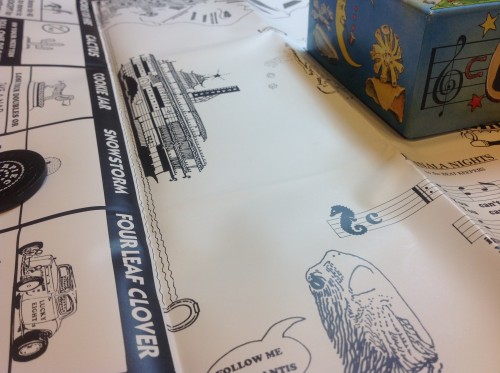
As if to embody this very statement, the first bread crumb along CENTERPIECE‘s allegorical trail is the fact that the game’s box, colorfully illustrated by artist Lee Mothes, is also central—both literally and figuratively—to its gameplay. Once the board has been unfolded, the box top is placed at its center, a mechanically unimportant gesture that receives special emphasis in the game rules—and is hammered home with every turn, as the dice pounding off of its cardboard surface speak testimony to its substance (that the dice must be rolled off of the box top is another apparently superficial but ritualistically significant gesture). As the eponymous centerpiece, this raised rectangle of cardboard naturally draws the eye—it is the only spot of color in an otherwise black-and-white composition—while hiding the game’s deepest secrets. A display of puzzle pieces nestled beneath track the players’ scores, and it is to Muehlmeier’s infinite credit that he keeps this indispensible information hidden away until the moment that the box is lifted, a moment that always coincides with a change in the data under scrutiny. It is the uncertainty principle actualized.
December 4th, 2013 / 12:00 pm
Favorite Books Read During 2013
December already?? A brief & informal list of some of my favorite books read during the year 2013 (not necessarily published in 2013).
***
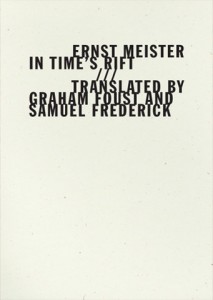 In Time’s Rift by Ernst Meister (Wave Books, 2012)
In Time’s Rift by Ernst Meister (Wave Books, 2012)
Translated by Graham Foust and Samuel Frederick
This,
the familiar,
will eternally be
an unknown to you;
anyway, you’re no longer
known to yourself.
 Béla Tarr, The Time After by Jacques Rancière (Univocal Publishing, 2013)
Béla Tarr, The Time After by Jacques Rancière (Univocal Publishing, 2013)
Translated by Erik Beranek
“We cannot identify ourselves with their feelings. But we enter into something more essential, into the very duration at the heart of which things penetrate and affect them, the suffering of repetition, the sense of another life, the dignity assumed in order to pursue the dream of this other life, and to bear the deception of this dream.”
 Creature by Amina Cain (Dorothy, A Publishing Project, 2013)
Creature by Amina Cain (Dorothy, A Publishing Project, 2013)
“When I got home, my partner was eating an egg. This is what he does when I’m not around. He also eats fish. I was harsh to him, but without speaking. I expressed myself through the violent putting away of a pan. Later I saw on his lap and dreamed about the future. This was together alone.”
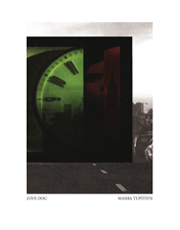 Love Dog by Masha Tupitsyn (Penny-Ante Editions, 2013)
Love Dog by Masha Tupitsyn (Penny-Ante Editions, 2013)
“My ears have been hearing things, things which aren’t even words, or messages, while my eyes, along with everyone else’s, are forever telling me that nothing is here. That nothing is happening. It is the difference between inward and outward. Between me and everyone else.”
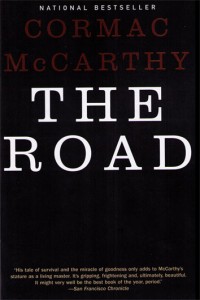 The Road by Cormac McCarthy (Vintage Books, 2007)
The Road by Cormac McCarthy (Vintage Books, 2007)
“He walked out in the gray light and stood and he saw for a brief moment the absolute truth of the world. The cold relentless circling of the intestate earth. Darkness implacable. The blind dogs of the sun in their running. The crushing black vacuum of the universe. And somewhere two hunted animals trembling like ground-foxes in their cover. Borrowed time and borrowed world and borrowed eyes with which to sorrow it.”
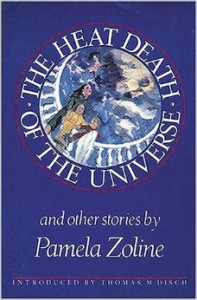 The Heat Death of the Universe and Other Stories by Pamela Zoline (Mcpherson & Co, 1988)
The Heat Death of the Universe and Other Stories by Pamela Zoline (Mcpherson & Co, 1988)
“2. Imagine a pale blue sky, almost green, with clouds only at the rims. The earth rolls and the sun appears to mount, mountains erode, fruits decay, the Foraminifera adds another chamber to its shell, babies’ fingernails grow as does the hair of the dead in their graves, and in egg timers the sands fall and the eggs cook on.”
 The Memoirs of JonBenet by Kathy Acker by Michael du Plessis (Les Figues Press, 2012)
The Memoirs of JonBenet by Kathy Acker by Michael du Plessis (Les Figues Press, 2012)
I’m afraid we’re inventing something that isn’t there.
Why is sex with you another blank?
Waiting, as you consider it, is fine but there comes a moment when the conditions you impose outweigh any present emotions. “I can’t be with you until…” translates into “I can’t be with you until caution becomes indifference.” Yes, as you say over and over again, you’ve made me feel again; truly, I do feel again, enough to be able to tell you that I’m only telling myself that I feel with you.
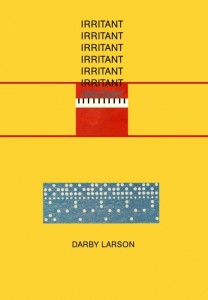 Irritant by Darby Larson (Blue Square Press, 2013)
Irritant by Darby Larson (Blue Square Press, 2013)
“In something of red lived an irritant. Safe from the blue from the irr. And this truck went in it. Safe. Something of red in it back to the blue to the red. This truck and something extra. Listen. The nearby something extras in front of the truck. The man in front of the truck trampled from front to back safe from the blue. And all this while the man scooped shovels of dirt and trampled from front to back front to back.”
 Anna Patova Crosses a Bridge by Renee Gladman (Dorothy, A Publishing Project, 2013)
Anna Patova Crosses a Bridge by Renee Gladman (Dorothy, A Publishing Project, 2013)
For one second, I spoke “sentence,” which confused her, since all this time I’d been saying “paragraphs.” It was a moment of our mouths missing one another. Her mouth was emitting sound. She seemed to be calling my name, breathing heavily, she seemed to put her words inside me. “Writing my frightening paragraphs,” I said, involuntarily.
 War and War by László Krasznahorkai (New Directions, 2006)
War and War by László Krasznahorkai (New Directions, 2006)
Translated by George Szirtes
“I no longer care if I die, said Korin, then, after a long silence, pointed to the nearby flooded quarry: Are those swans?”
 Music & Literature Issue 2: Krasznahorkai / Tarr / Neumann (Spring 2013)
Music & Literature Issue 2: Krasznahorkai / Tarr / Neumann (Spring 2013)
From “About a Photographer” by Lászlo Krasznahorkai (Translated by George Szirtes):
“Condemned to look, yet at the same time to be deprived of sight, we are in a complex pitiless trap, a double cage, to the recognition of which—though it cages us all—fate condemns confusingly few. In any case those who do suffer the agonizing moment of recognition could easily be consumed by an all-but fatal melancholy, so it’s no wonder they try to struggle free, their first recourse on their dire necessity being the thought of some device.”
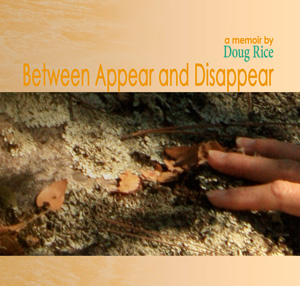 Between Appear and Disappear by Doug Rice (Jaded Ibis Press, 2013)
Between Appear and Disappear by Doug Rice (Jaded Ibis Press, 2013)
“I want to find a sentence that in the making becomes a resurrection. Our skin marked by the remains of language from childhood dreams near the river. The Allegheny. The Monongahela. The Ohio. This trinity of cold rivers that demand that we never forget to forgive.”
 Murder by Danielle Collobert (Litmus Press, 2013)
Murder by Danielle Collobert (Litmus Press, 2013)
Translated by Nathanaël
“It’s strange this encounter with the internal eye, behind the keyhole, that sees, and finds the external eye, caught in flagrante delicto of vision, curiosity, uncertainty. The one that looks out, to see outside itself, what is happening in the world, perhaps, or inside itself, this eye, doesn’t know whether it’s looking into the emptiness, into the air, into the other, or into a distance landscape, which it brought to like, like a memory, a wanted decor, chosen, an elemental power, that could be the background of its life.”
I Like Church A Lot
Hey, I had to go to a church recently. I was doing some childcare for a relative, and it was on a Sunday. Kids of a certain age lead an orderly life. Included in the order of the lives of the kids for whom I was providing some childcare was their regular Sunday morning visit to a Unitarian church in Seattle. Being a dutiful relative, I agreed to keep the child to the child’s orderly life and attend a Unitarian church service with the child.
And I had a pretty good time. It seems I like church a lot.
Turns out even though I stopped going to church 28 years ago, and even though I attended an Anglican church during the years I attended church, I still had all the rhythms of church hardwired in me. I may not have known the specifics of the creed or the words to the hymns and the prayers, but I felt like I knew all the gestures and the sentiments. I knew when to stand and when to sit. The Unitarian service’s language seemed a little strange to me—it was 19th century, and felt American, and seemed weirdly concerned with architecture—but everything else clicked into place pretty easily.
Best of all, though, it gave me an opportunity to sit and really think about death. I mostly don’t really write anymore. I mostly just sit and think about death. I mostly try to sleep and can’t sleep because I start to think about death and then find I can’t sleep because I’m thinking about death. And I mostly feel weird about lying in bed thinking about death because it doesn’t seem like the right place to be thinking about death, so I don’t sleep. I should be trying to sleep. I should be trying to clear my mind. I fight to clear my mind. I fight to clear out thoughts of death. And I fail and fail and fail.
Churches, as I’m sure you are already aware, are all about death! They don’t ask you to clear your mind of all thought of death.
And the church didn’t just give me a place to think quietly about death. It was a place to think about it actively and in a participatory way. It gave me plenty of cues telling me that I was in a place where thinking about death was encouraged. I found myself thinking about death in the proper setting. The right context. It was fantastic.
Like:
Many of the seats in the church have little plaques on them. The plaques say that the seats were “given” to the church in honor of someone. And that someone is dead!
Many of the books in the church have bookplates in them. And the bookplates say that the books were “given” to the church in honor of someone. And that someone is dead, too!
The programs they give you when you enter the nave to find a seat are filled with the names of the dead. The songs sung in a church are slow and quiet and mention death a lot. There are moments in a church service when everyone is asked to sit quietly, and during those moments, you can hear little creaking noises and breaths and coughs. Human bodies are filled with gas, and after death they make creaking and sighing noises. And the “death rattle” is a sort of choking cough people near death make when their throats fill up with saliva they can’t swallow because they are dying and all their energy is going to that instead of to swallowing.
And, of course, a church was just lousy with older people who are really close to their own deaths. They’re the ones making most of the noises in the moments of quiet reflection. Because their bodies are getting away from them. Because getting older is just the our bodies getting away from us. Until finally, we can’t stop our bodies from getting so far away from us, they cease to function entirely. Try as we might to stop it from happening, our bodies just give up. Think about that next time you are unable to keep from coughing. Your brain fights and fights, but you cough, because you can’t will your body to stop. You’re going to die someday, and it might be like that. Your mind might be sharp or it might be dulled with medication or decay, but it might still try to will your body to keep going, but your body won’t have you telling it what to do. It will just stop working.
Thinking about that in church felt far less menacing to me than it does when I’m in bed, and the person next to me is asleep. And I’m not asleep, but I’m trying to sleep, and instead I’m worrying about death.
I like church a lot.
Have a good weekend, everyone.
<3 Love & Lovers <3
Whoa, hi, I’m still reeling from this reading I went to on Friday night, which was all about Perfect Lovers Press, which is run out of Cincinnati, which (PLP + Cinci) is run by Dana Ward and Paul Coors. It was held at The Poetry Project and it was something that went really, really late into the night and it was something that was just about perfect–with amazing readings from amazing people like Yvette Nepper (who just ruined everyone so here’s her chapbook) and Sue Landers (who has a chapbook called What I Was Tweeting While You Were on Facebook, but I can’t find a link so yeah holler @ Dana & Paul) and Micah Freeman (who said “Hi” to everyone and read these amazing poems that are kind of about Amy Winehouse but also not really, it’s all about our peaks and valleys, the whole thing) and John Coletti (who just wow) and other people and especially Leopoldine Core, who I have really, really liked for a really, really long time so I took some video:
and I just thought everything she read was so full and so rough, especially when she’s all:
of how easy it is
to know me
i’m so familiar
naked all the time
my same legs
my ass
i am such a weird little girl
for wanting to live in your
light
picketing in the heat
like an ant
and I don’t know what else to say, besides energy, man–it’s kind of everywhere.
Mary Jo Bang’s Elegy
I like chocolate chip cookie dough tons and I like death tons too.
Mary Jo Bang’s collection of poems, Elegy, doesn’t really touch on the former, but it does really touch on the latter.
The completely consuming force of death is illuminated in Mary Jo’s book. When someone asks her to define a day, Mary Jo replies: “Tragic from beginning to end.” As with a deft totalitarian leader, death is unceasingly omniscient: Mary Jo is covered in calamity.
There’s no timeout for Mary Jo. Some shut eye is shut down. In “Beneath the Din” Mary Jo reveals she’s in the “insomnia hour.” Later on, Mary Jo declares, “My ear is a beach / And the sea is talking to it incessantly.” Just as Heathcliff won’t let the Catherines be, death won’t stop his pursuit of Mary Jo. In “No Exit,” Mary Jo refers to her “tragic flawed fate going on and on and on.” It’s as if Mary Jo is a Victorian heroine and death is her boyfriend, who, though mean and rough, is still her one true love.
Death’s determination dismantles Mary Jo’s perception of time. The differentiation of months dissolve and what’s to come collies with the present. “A year in tatters is interrupted by the thought / That the future is manacled / To the indefatigable now of February,” says Mary Jo in “January Elegy.” It’s as if Mary Jo keeps her very own calendar. Death’s supplied her with a new system for marking time, which is what those bellicose, guillotine-inclined French Revolution boys did for a bit by altering the number of days in a week and renaming months.
In Ghostbusters II, the Marshmallow Man’s monstrous steps scatters all the New Yorkers in his path. In Mary Jo’s world, “every step is a dangerous taking.” The Marshmallow Man and death deliver destruction. Each movement is so scary to humans since each movement produces the possibility that humans and human things will be wrecked with impunity. The NYPD (who, unlike liberal New Yorkers, I like) couldn’t punish the Marshmallow Man and they can’t punish death.
So strong is death that non-human entities are scared of it too — even ghosts don’t try speaking to death about baseball or inviting it to tea: they simply “go blank” in its presence.
One of Mary Jo’s poems ends: “These birds eat and eat. Everything.” By birds, is Mary Jo speaking about death? It’s highly likely, since, as with the birds, death can tuck every single thing ever into its tummy.
Another poem of Mary Jo’s commences: “This was the drama / Of impossibility.” Throughout the collection there’s considerable references to performance, such as actors, screens, masks, and audience members. Since everything is performance (and everything really is a performance, so hush), death’s show is the best one, because death lasts forever, and in “Elegy,” Mary Jo spotlights the gargantuan ghastliness of death’s spectacle: “an intolerable end that keeps going on.”
November 11th, 2013 / 1:26 pm
World Series Baseball 2013
World Series baseball is quite comely. The competition is carried out outside in the fall, so leaves are dying and falling off trees, it’s cold, and you get to start sporting layers, like multiple hoodies over a meaningful sweater over a button-down.
Moreover, baseball is slow, like an elderly person, and it’s quiet, like a deaf-mute. Both the elderly and deaf-mute are meritorious. The elderly are grumpy and crabby (as one should be), and deaf-mutes don’t talk and don’t hear, which is optimal, as there is very little that can be conveyed through talking and listening that can’t be conveyed much more marvelously through a poem, a story, or a Tumblr post
In “[The crowd at the ball game],” New Jersey boy William Carlos Williams compares the baseball setting to a totalitarian society, and that’s sensational.
This World Series is especially estimable because the St. Louis Cardinals are participating, and they feature many cute boys, like the hard-throwing closer, Trevor Rosenthal, and the tough as a truck catcher, Yadi.
Presently, the Cardinals and the meat-head East Coast liberals that some refer to as the Boston Red Sox have each won two games. If you haven’t been keeping up with all of the excitement then read Baby Marie-Antoinette’s recap of the first four games:


